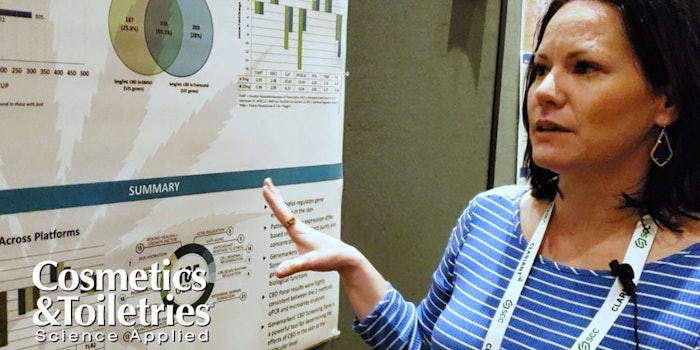
Does CBD affect skin in the ways we think? What do the genetic markers tell us?
In this poster presentation, given by Bridget Early of Genemarkers, we learn the results of this hot skin care trend via the testing of commercial products and extracts using the company's new panel test—plus, how the choice of solvent can affect the resulting outcome. Watch now to learn more; see below for our update with additional Reader Commentary.
Update: Reader Commentary
As expected, the above video (and the CBD topic in general) stirred reader interest. Below are some of the questions/answers submitted; perhaps you were wondering the same.
Comment 1: You mentioned "therapeutic levels" and you use DMSO, which is banned for skin topicals. Both could be misleading.
Right now, the U.S. Food and Drug Administration (FDA), along with the U.S. Drug Enforcement Administration (DEA) and Department of Justice (DOJ) consider CBD oils as control substances (Class 1) and there are two commercial entities allowed to market CBD-based products; one is GW Pharmaceuticals and the other is our [unamed] client who has filed an investigational new drug (IND) application to use CBD oils for skin applications.
Response 1: I mentioned there are “therapeutic applications” of CBD rather than therapeutic levels. We tested a CBD extract dissolved in either DMSO or Transcutol, a common solvent used in the skin care industry. Both showed changes in gene expression when applied to in vitro skin tissues.
Response 2: CBD oil from hemp is legal, CBD oil from marijuana is in the grey, depending on the state. Any product with a THC content of more than 0.3% can only be sold in states that have approved marijuana for recreational use. CBD with a THC content of less than 0.3% is no longer considered a controlled substance. This level is currently the industry standard.
Comment 2: People have not read the entire 2018 Update to the 2014 Farm Bill where CBD oil is still a controlled substance.
They could have said hemp seed oil but this doesn't have the same impact as CBD oil. There is so much misunderstanding that it has become the Wild West. My firm is in the process of planning a seminar/workshop in this area and [as a cautionary note, you could be headed toward] a regulatory and legal nightmare. [I recommend you check this out.]
Additionally, it’s unlawful under the FD&C Act to introduce food containing added CBD or THC into interstate commerce; or to market CBD or THC products as, or in, dietary supplements, regardless of whether the substances are hemp-derived.
The following explains in detail:
https://www.fda.gov/NewsEvents/Newsroom/PressAnnouncements/ucm628988.htm
and perhaps this article could shed some light:
https://www.brookings.edu/blog/fixgov/2018/12/14/the-farm-bill-hemp-and-cbd-explainer.
Response 1: Thank you. Most topical products being produced and sold in the U.S. fall under the FDA's Cosmetics Laws & Regulations division. Those regulations are different than those for food and supplements. Currently, topical cosmetic products containing CBD are legal as long as they contain less than 0.3% THC in most states regardless of whether or not marijuana is legal medicinally or recreationally.
Editor's note: For additional comments or questions, please send us a message at [email protected].











